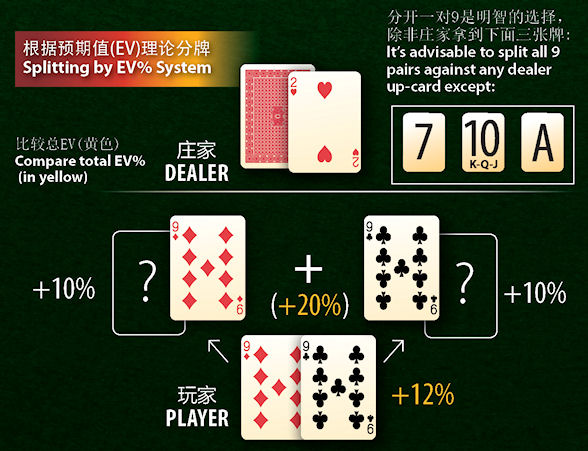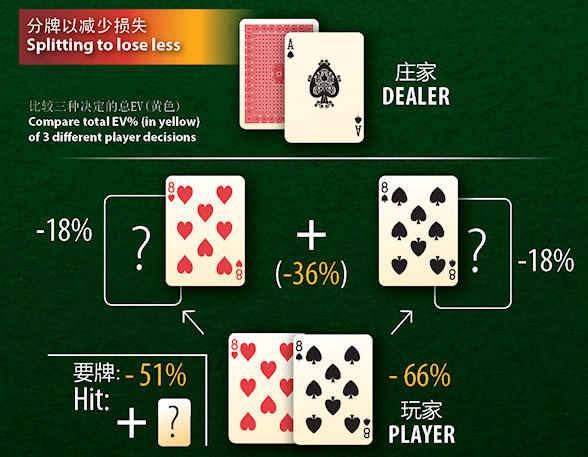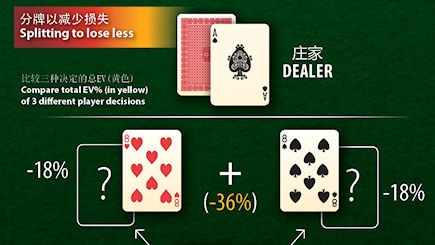This article first appeared in the Jul/Aug 2013 issue of World Gaming magazine.
It’s amazing to think we have now produced 25 issues of World Gaming magazine (WGM) since our launch in late 2009. Since then we have brought you insights into all things gaming in Macau, Asia and across the globe.
 One of our favorite topics over the years has been gaming strategy. While we would never proclaim we can guarantee you a winning session, our strategy tips will certainly increase your chances of winning and give you more bang for your gaming buck.
One of our favorite topics over the years has been gaming strategy. While we would never proclaim we can guarantee you a winning session, our strategy tips will certainly increase your chances of winning and give you more bang for your gaming buck.
This issue we look at a story that first appeared way back in issue #2 (Chinese New Year 2010) and remains a troubling question for blackjack players the world over – to split or not to split.
Too many players either don’t know when or why to split pairs or simply split them randomly without realising there is always a mathematically correct decision to be made. Learning when to split and when not to can make the difference between a winning and losing session at the blackjack tables so it pays to know what you’re doing!
We hope you enjoy this issue’s “blast from the past” and remember that, as always, all our past issues and articles can be found on our website, www.wgm8.com.
Time and time again I see people making mistakes when playing BlackJack in casinos, especially when playing pairs. The logic to hitting, standing, doubling and even surrendering is somewhat intuitive, but the logic behind pair splitting often isn’t.

When dealt a pair, most players decide whether to split or not based on a subjective value judgment about only part of the situation they face. Even worse, some people just guess! This is simply bad play.
When faced with the decision on whether or not to split, players have a choice between two options: take one of something, or take two of something else.
Think about this – suppose somebody walked up to you in the street, and offered to give you $500. Great! But – what if he suggested a second option – giving you $300 twice? Obviously $300 twice is better than $500 once, so you would choose option two. Here’s another example – someone says you have to pay $200 once for something, or alternatively you can pay $175 twice. Obviously paying $200 once is better than paying $175 twice.

Pair split decisions are like that. Let’s say you get dealt a pair of nines against a dealer upcard of two. Most players are usually content to take the hand of 18 and stand on it. To make the correct decision, you should think in terms of expected value (usually called EV). I’ll explain EV properly in a future column, for now you can think of it as what a hand is worth. EV is a percentage which can be positive or negative. Standing on your pair of nines has an EV of +12 per cent. You could split the nines, giving up on your eighteen and playing two hands, each starting with a nine. It turns out that each nine on its own has an EV of +10 per cent, so the EV for splitting is +20 per cent (two hands of +10 per cent each). It actually turns out that you should split a pair of nines against all dealer upcards except a seven, ten or ace.
Sometimes, as in the last example, you split to make more money. Other times, you split to lose less. Let’s say you have a pair of eights and the dealer has an ace. This is a truly horrible situation, with a lot of negative EV. You can’t surrender, so you have to decide whether to split or not. A lot of players will throw their hands up in the air and just hit (or even stand), thinking one bad hand is better than two!

Let’s do the math – assuming we are in a casino where you can only lose your original bet if the dealer gets a BlackJack (which is the rule in most Macau casinos). It turns out that standing has an EV of -66%, hitting is -51%, but splitting creates two hands, each with an EV of just -18%. So the correct play is to split! This play just seems wrong to a lot of players, but in fact they are the ones who are wrong. Yes, it’s true that by splitting you can lose twice as much on that one particular hand, but in the long run you’ll do much better by having the discipline to always split your eights, even when the dealer has an Ace. In fact, it turns out to be correct to split eights against any dealer upcard at all. It’s even correct to split eights against the dealer’s ten – surrender is slightly worse than splitting (under most Macau rules).
In the coming columns I’ll be discussing a lot more on winning strategy, so please email your BlackJack questions to me at ceo@wgm8.com.







